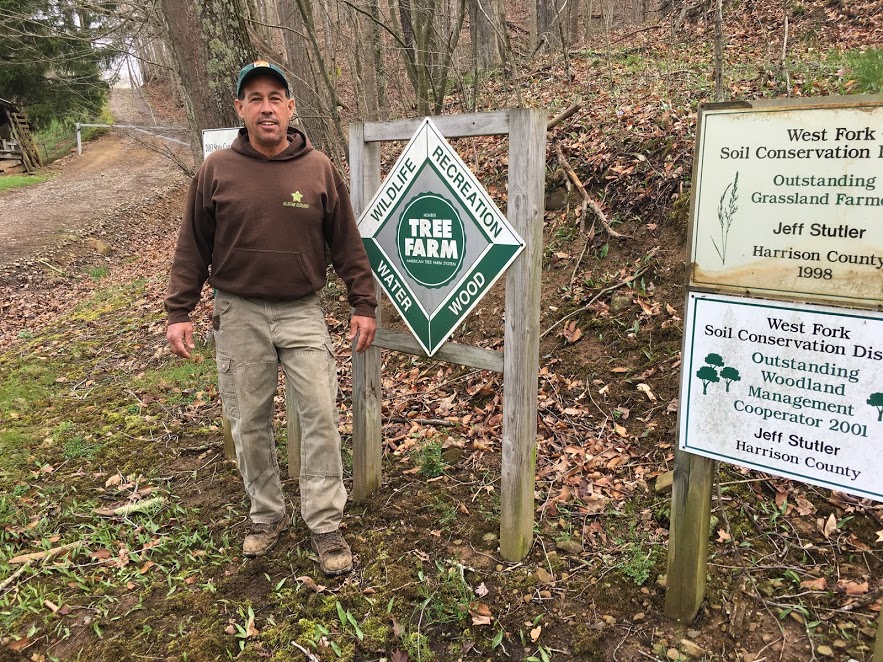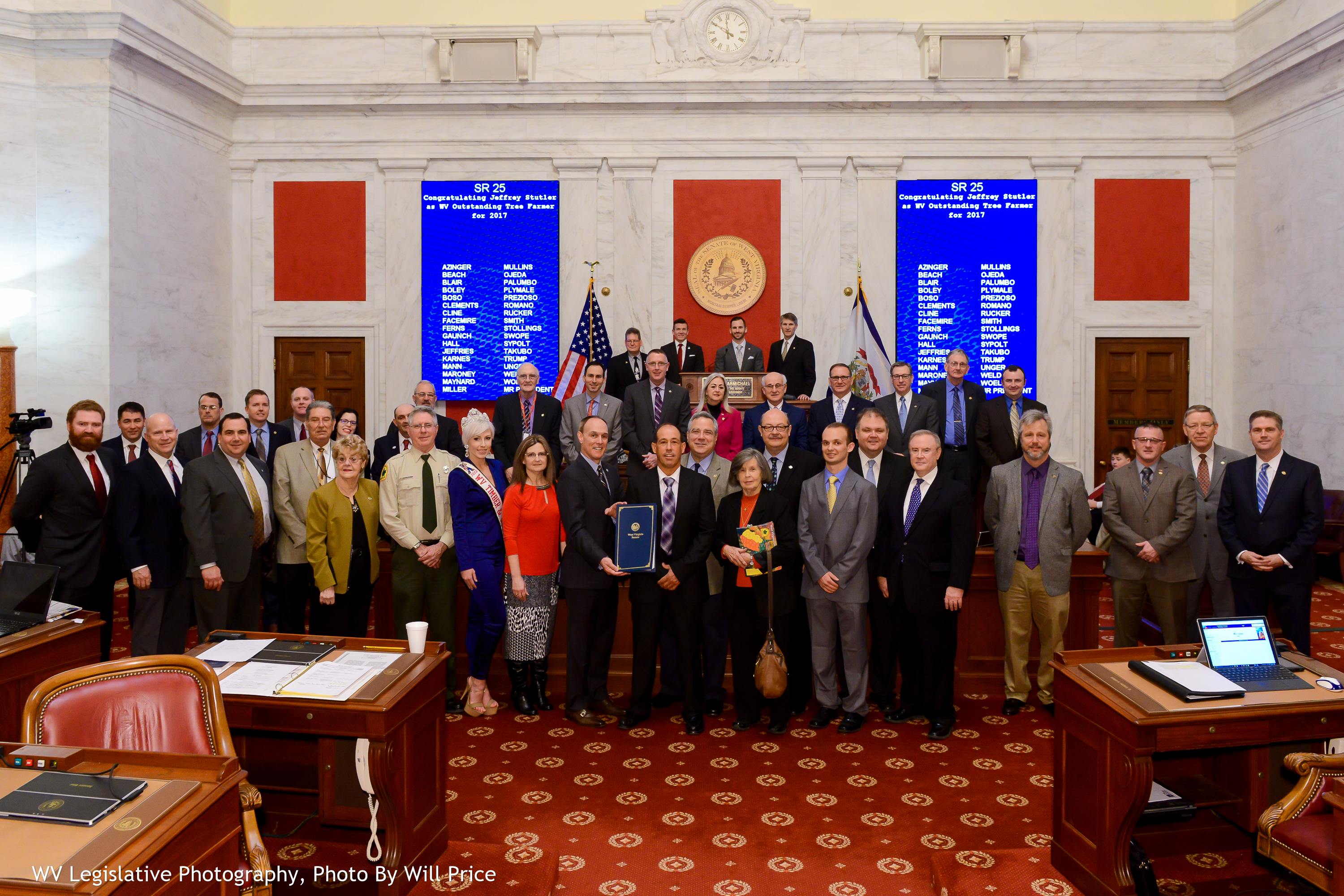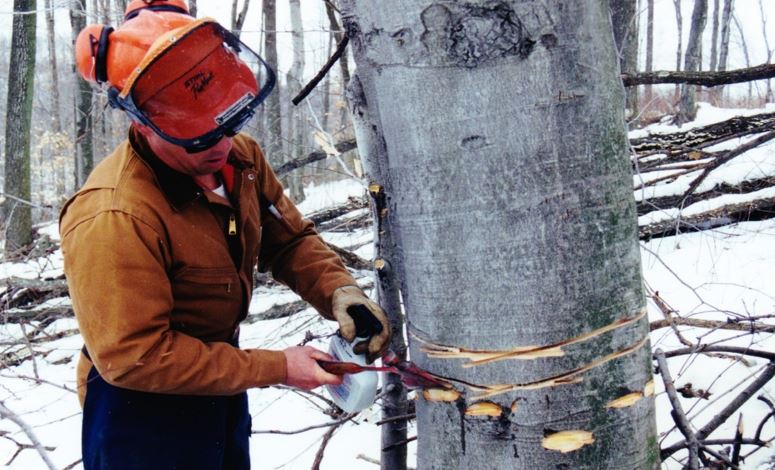Northeast Nominee: Jeffrey Stutler from West Virginia
What makes them outstanding?
Originally purchased in 1899,
the JD Angus Farm owned by Jeffrey Stutler was awarded West Virginia 2016 Tree
Farm of the Year. The WV Senate awarded
him a resolution acknowledging him for this accomplishment. Jeff and his family have won conservation awards
and are active in implementing forestry, wildlife, recreation, and wetland
practices on their 318-acre farm. Their
first forest stewardship plan was developed in 1994 and ever since Jeff has
worked improving the productivity of his woodlands. Jeff works for an ecological restoration firm
that applies to other farms and woodlands practices that he implements on his
own property. The property is utilized
extensively by family and friends for deer and turkey hunting. There is a 3.1 mile cross country running
trail that was designed and constructed by Jeff and his son Kyle. It is used for training purposes by the
Fairmont State University cross country team of which Kyle is a member. There are two record West Virginia champion
big trees on his property--white ash and black maple. Recent management practices on the JD Angus
Farm include herbicide treatment of tree-of-heaven and other non-native
invasive species, grapevine deadening, four-acre fenced shrub release,
preparation of a 20-acre timber sale, planned 20-acre wetland and streambank
stabilization mitigation project, herbicide oak understory release and a
planned 40-acre bat habitat enhancement mitigation project. In cooperation with the NRCS, several Pasture
Walks have been conducted on the property.
Jeff’s passion has been to demonstrate good forest management and farming
techniques.
Virginia 2016 Tree
Farm of the Year. The WV Senate awarded
him a resolution acknowledging him for this accomplishment. Jeff and his family have won conservation awards
and are active in implementing forestry, wildlife, recreation, and wetland
practices on their 318-acre farm. Their
first forest stewardship plan was developed in 1994 and ever since Jeff has
worked improving the productivity of his woodlands. Jeff works for an ecological restoration firm
that applies to other farms and woodlands practices that he implements on his
own property. The property is utilized
extensively by family and friends for deer and turkey hunting. There is a 3.1 mile cross country running
trail that was designed and constructed by Jeff and his son Kyle. It is used for training purposes by the
Fairmont State University cross country team of which Kyle is a member. There are two record West Virginia champion
big trees on his property--white ash and black maple. Recent management practices on the JD Angus
Farm include herbicide treatment of tree-of-heaven and other non-native
invasive species, grapevine deadening, four-acre fenced shrub release,
preparation of a 20-acre timber sale, planned 20-acre wetland and streambank
stabilization mitigation project, herbicide oak understory release and a
planned 40-acre bat habitat enhancement mitigation project. In cooperation with the NRCS, several Pasture
Walks have been conducted on the property.
Jeff’s passion has been to demonstrate good forest management and farming
techniques.
Tree Farmer story
It all started over a hundred years ago. Jeff Stutler’s great grandfather, Lemuel Heldreth purchased the initial 92 acres in 1899. The property was transferred to his grandfather, Langford Harbert in 1948 and to his mother in 1959, Letha Harbert-Stutler. In 2009, his grandmother, Ellen Harbert added 95 acres. In 1999, Jeff Stutler purchased an additional 141 acres, sold 10 and added the remainder to the Tree Farm property that he now manages.
For many years the property was utilized for farming and as a homestead. The woodland was used for farm products and firewood for many years. Jeff and family raise cattle on the farm. In 1994 the first forest management plan for the property was completed. Three additional plans have been prepared since then. The most recent plan was prepared in 2015. During the 1990s, Jeff began in earnest implementing intensive forest management practices. The property was enrolled in the tree farm system in 1997. In 2017, because of all of the impressive forestry activities which the Stutlers were involved in, he was nominated and chosen as the West Virginia Tree Farmer of the Year. Since then, there has been no let-up in their use of the Tree Farm as a ‘hands on’ demonstration tool for sound forest management.
 Jeff grew up on this property
and resides there now with his wife, Lori.
They have two children, Erica and Kyle.
He attended school in the area and graduated from Lincoln High School in
Shinnston, West Virginia. Jeff graduated
from the United Carrier Center in Gore, West Virginia in 1983 where he earned
an Electrical Certificate. He then
studied Electrical Engineering at Fairmont State University in 1983-1984. In the past, he had worked for the Harrison
County Power Station and for Grounds Keeper, a landscaping business. Jeff has many hobbies including weight
lifting, running, sky diving, brush hogging and hunting. His biggest passion is working on the farm
where he raises cattle and manages his woodlot.
Jeff is currently employed by Allstar Ecology as their Vegetation
Management Coordinator in the Maryland, Pennsylvania, Ohio and West Virginia
areas. He supervises work crews with
herbicide applications to control unwanted vegetation, non-native invasive species
(NNIS), streambank stabilization projects and wildlife habitat management. He also constructs bat boxes and works on bat
habitat management projects (endangered species). This passion for natural resources work has
resulted in numerous tours and workshops held on their Tree Farm. Jeff resides on his West Virginia Tree Farm
in the original house constructed by his forebears. He has spent many years preparing his farm
for demonstrating new, innovative farming and forestry practices. He has received awards for his dedicated work
such as State Conservation Farm of the Year, State Tree Farm of the Year,
Outstanding Grassland Farm of the Year and Outstanding Woodland Management
Cooperator.
Jeff grew up on this property
and resides there now with his wife, Lori.
They have two children, Erica and Kyle.
He attended school in the area and graduated from Lincoln High School in
Shinnston, West Virginia. Jeff graduated
from the United Carrier Center in Gore, West Virginia in 1983 where he earned
an Electrical Certificate. He then
studied Electrical Engineering at Fairmont State University in 1983-1984. In the past, he had worked for the Harrison
County Power Station and for Grounds Keeper, a landscaping business. Jeff has many hobbies including weight
lifting, running, sky diving, brush hogging and hunting. His biggest passion is working on the farm
where he raises cattle and manages his woodlot.
Jeff is currently employed by Allstar Ecology as their Vegetation
Management Coordinator in the Maryland, Pennsylvania, Ohio and West Virginia
areas. He supervises work crews with
herbicide applications to control unwanted vegetation, non-native invasive species
(NNIS), streambank stabilization projects and wildlife habitat management. He also constructs bat boxes and works on bat
habitat management projects (endangered species). This passion for natural resources work has
resulted in numerous tours and workshops held on their Tree Farm. Jeff resides on his West Virginia Tree Farm
in the original house constructed by his forebears. He has spent many years preparing his farm
for demonstrating new, innovative farming and forestry practices. He has received awards for his dedicated work
such as State Conservation Farm of the Year, State Tree Farm of the Year,
Outstanding Grassland Farm of the Year and Outstanding Woodland Management
Cooperator.
Jeff manages his Tree Farm for multiple objectives. Among these objectives are timber production, wildlife habitat management, recreation, aesthetics, erosion control and stream stabilization and conservation practices. And, above all, demonstrating multiple-use sustainable forest management. The Stutler family want people to learn that a Tree Farm can be a financial asset if you are willing to diversify and work hard. Jeff uses the Tree Farm as a tool to demonstrate to the public that you can take care of a piece of property and directly benefit from its various resources. He demonstrates his management philosophy by showcasing the many different forestry and farm resources contained on the Tree Farm.
Overall, the high quality woodlands and cattle farming on JD Angus Tree Farm are a testament to the hard work of the Stutlers over the years. Continual management practices, such as creation of cutback borders, forest openings and clearings, cull tree and grapevine removal, crop tree release, selective commercial timber harvests, understory oak releases and a NNIS control program have kept the trees growing vigorously and concentrated the growth energy of the property on good quality stems while maintaining quality wildlife habitat. Although there have been setbacks, such as NNIS infiltration, constant vigilance and management by Jeff and his family has kept the woodlands of JD Angus Tree Farm in great shape to provide high quality timber products, water and wildlife habitat now and well into the future.
For the following areas describe how the landowner's management addresses it
Wood: Since Jeff started doing forestry work on his property, he has been very selective in management implementation. He is always applying some form of forest management to all of the woodland. Harvesting has always been done very carefully. Since 1984 to present, Jeff has salvaged dead or down timber and utilized post-harvest logging debris for his firewood business. He has sold one 55 acre (225 MBF) commercial timber sale which involved 100% tree marking, sealed bids, written contract, application of BMPs, a well-planned road system, frequent compliance checks and final reclamation with wildlife friendly seed mixes. Another 20 acres has been marked and is presently up for sale. Jeff is vigilant when dealing with NNIS, controlling infestations of autumn olive, bittersweet, tree-of-heaven, Japanese barberry and Japanese stiltgrass, along with others as they are discovered.
Water: The property is divided
by Little Run, which is a tributary of Jones Run. The watershed eventually
empties into the West Fork River which flows north. In recent years, Jeff has spent time
installing erosion control measures, while primarily concentrating on
streambank stabilization projects to reduce potential flood damage and to
upgrade and protect the quality of the stream which flows through his property.
eventually
empties into the West Fork River which flows north. In recent years, Jeff has spent time
installing erosion control measures, while primarily concentrating on
streambank stabilization projects to reduce potential flood damage and to
upgrade and protect the quality of the stream which flows through his property.
Wildlife including threatened and endangered species: The JD Angus Tree Farm is home to a wide variety of native wildlife. In addition to game species such as deer, turkey and squirrels, there are numerous nongame wildlife species found on the property. Jeff’s forest and wildlife management practices have enhanced wildlife populations and species diversity on his Tree Farm. He has noted an increase in mast production resulting from timber stand improvement work and implemented selective harvests. Trees with well-formed crowns are favored as residual trees to ensure mast production. He temporarily fences off steep pasture areas and maintains them by mowing which attracts deer, turkey and numerous species of songbirds. Jeff also maintains nine acres of wildlife clearings (four total) in switch grasses, annuals and cool season mixtures. He has recently fenced a four acre woodland/poor pasture area from cattle and is eradicating NNIS and promoting the understory establishment of dogwood (and other shrubs). The hickory overstory will be allowed to grow. A 40 acre bat habitat enhancement project is planned for the near future. This will consist of roost tree girdling, water hole development and installing bat boxes. There are no known threatened or endangered species to address on the property.
Recreation and Aesthetics including special sites: There are many trails and access roads maintained on the JD Angus Farm. They are used for access, responsible ATV travel and wildlife habitat. There is a 3.1 mile cross country running trail that was designed and constructed by Jeff and Kyle. It is used for training purposes by the Fairmont State University cross country team of which Kyle is a member. The trail is well marked with metal signs. The property is utilized extensively by family and friends for deer and turkey hunting. Jeff applies the Quality Deer Management Association (QMDA) management philosophy for his deer herd. As a result, the deer herd size and age structure is much more compatible with the habitat, lessening detrimental impacts to the pastures and woodland. Jeff maintains the Tree Farm with the potential visual impacts influencing management work. The house, barns, buildings, pastures are all kept in good order. All forestry work is done with visual impacts under consideration.


